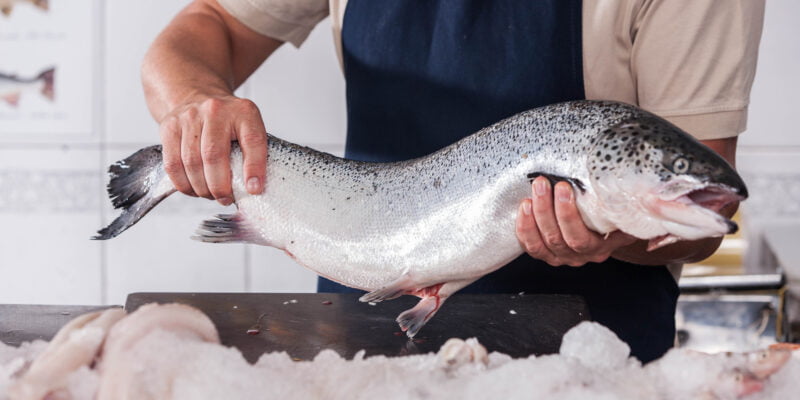#food #wild #farmed #salmon
“Rich in flavor, distinctive in color salmon is a favorite fish, offering lots vitamins and nutrients that are vital to human health, including abundant omega-3 fatty acids, long recognized for supporting the heart, brain, joints, and more“– Paul Ebeling
It can be confusing to select salmon.
The Big Q: Is the lean wild salmon better than the coral-hued farmed salmon?
The Big A: Read on!
Fish is the best and only source of the omega-3 fatty acids vital for optimal health, and salmon has the highest amount. Both wild and farmed salmon offer omega-3s along with vitamin D and are beneficial additions to our eating plan. Deciding which one to serve for dinner is a matter of taste.
It is easy to recognize wild salmon by its lean, firm flesh and vivid red hue with no striations of white fat. This is the hallmark of salmon that swims in the wild and eats a varied diet of shrimp and krill, which also contributes to richly flavored meat. Wild salmon hails from the Pacific Northwest and the scarlet sockeye are 1 of the most renowned breeds of salmon in the region.
Farmed salmon is fattier, with a light coral color. The striations of fat make it milder in flavor, tender in texture, and somewhat easier to cook. Because of the prohibition on fishing the endangered wild Atlantic salmon, this breed is most often farmed. Norway is a leader in sustainable salmon farming, raising the fish in open-ocean aquaculture enclosures.
Because of the abundant nutrients and vitamins in salmon, it is recommended that adults eat 2 portions a wk. Some of us prefer the more robust flavor and lean texture of wild salmon, while others like the milder tasting, more tender-textured farmed salmon.
- Wild salmon will have few calories and lower fat while offering more omega-3s, vitamin D, zinc, and minerals than farmed salmon.
- On average, wild salmon has 988 IU of vitamin D per 3.5-ounce serving, which is 124% of the daily value, whereas the same serving of farmed salmon provides about 250 IU of vitamin D or 32% of the daily value.
- Farmed salmon has more omega-6 fatty acids, due to its grain-supplemented diet, and more abundant fat.
There is not a clear correct answer in the debate between wild and farmed salmon. Both have plenty of protein and nutrients and will make a heart-healthy choice for home-cooked meals. So, support sustainable fishing and farming of the noble salmon to give you the highest quality fish.
Eat healthy, Be healthy, Live lively









